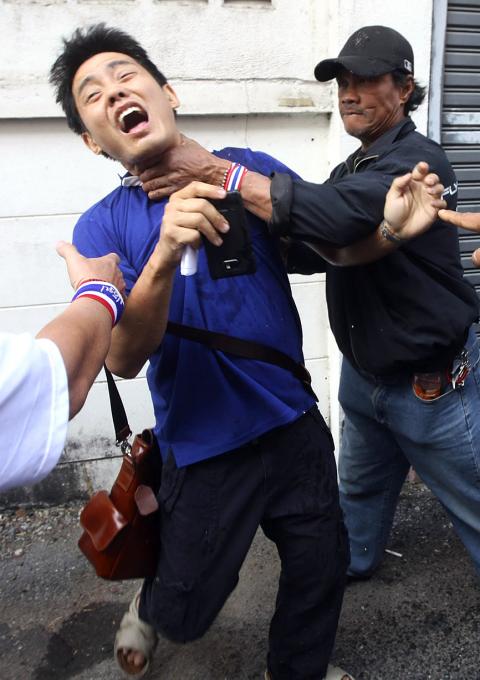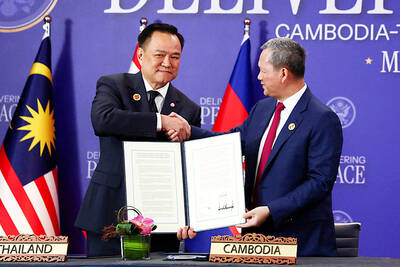Thailand’s Election Commission yesterday urged a delay in next week’s planned national vote, warning of more bloodshed after violent clashes over the weekend.
A delay would drag out a festering crisis that risks dividing the country. The military, which has often stepped in to take control in the past, is resolutely staying out of the fray this time, despite appeals from anti-government protesters.
“As election officials, it is our job to make sure elections are successful, but we also need to make sure the country is peaceful enough to hold the election,” commission member Somchai Srisutthiyakorn told reporters. “We don’t want it to be bloody.”

Photo: EPA
The commission will meet embattled Thai Prime Minister Yingluck Shinawatra today to discuss the vote date.
With protests aimed at toppling Yingluck now in their third month, there has been speculation that the armed forces might try a repeat of the 18 successful and attempted coups they have mounted in 80 years of on-off democracy in Southeast Asia’s second-biggest economy.
However, in comments to reporters, Thai Armed Forces Supreme Commander General Thanasak Patimapakorn, refused to be drawn on whether polls should be postponed.
“The Election Commission and the government will meet to discuss this tomorrow. Soldiers will not be able to say much more than this,” he said.
However, the military has also refused to rule out intervention.
The commission has said that the months of protests render the country too unstable to go to the polls on Feb. 2.
That argument was bolstered by the shooting on Sunday in Bangkok of a protest leader, taking to 10 the death toll since the protests started in November last year.
The protests, centered on the capital, Bangkok, have broad support among the city’s middle class and the traditional elite.
They are pitted against the mostly rural — and much larger — voting block in the country’s north made up of so-called “Red Shirt” supporters of Yingluck and her brother, former Thai prime minister Thaksin Shinawatra, who was forced out of office by a military coup in 2006.
Thaksin lives in self-imposed exile to escape a 2008 jail sentence for corruption.
Red Shirt leaders have threatened to descend on the capital again if the military steps in. At least 90 people were killed in street fighting in Bangkok in 2010 between troops and the Red Shirts.
In their latest comments, neither the government nor the protesters showed any sign of backing down.
“We have to press ahead with the Feb. 2 election... A postponement would be futile and would only give independent organizations more time to target the government,” Thai Minister of the Interior Jarupong Ruangsuwan, who also leads the ruling Puea Thai Party, told reporters.
Yingluck called the Feb. 2 election in the hope of confirming her hold on power and would almost certainly win by a large margin.
Yet, protest leader Suthep Thaugsuban, a former Thai deputy prime minister, has rejected the election outright. In a speech to demonstrators on Sunday he appealed to the military to “protect innocent people who fight with their hands.”
Yesterday, he said his “Bangkok Shutdown” movement would not accede to government requests to free up access to ministries and state agencies that they have blockaded.
About 2.16 million people have registered for early polling in the country, out of 49 million voters.
Somchai said that a one-month delay may not be enough to resolve the deadlock, but waiting too long would leave the caretaker government unable to administer the country properly.

Shamans in Peru on Monday gathered for an annual New Year’s ritual where they made predictions for the year to come, including illness for US President Donald Trump and the downfall of Venezuelan President Nicolas Maduro. “The United States should prepare itself because Donald Trump will fall seriously ill,” Juan de Dios Garcia proclaimed as he gathered with other shamans on a beach in southern Lima, dressed in traditional Andean ponchos and headdresses, and sprinkling flowers on the sand. The shamans carried large posters of world leaders, over which they crossed swords and burned incense, some of which they stomped on. In this

‘NO COUNTRY BUMPKIN’: The judge rejected arguments that former prime minister Najib Razak was an unwitting victim, saying Najib took steps to protect his position Imprisoned former Malaysian prime minister Najib Razak was yesterday convicted, following a corruption trial tied to multibillion-dollar looting of the 1Malaysia Development Berhad (1MDB) state investment fund. The nation’s high court found Najib, 72, guilty on four counts of abuse of power and 21 charges of money laundering related to more than US$700 million channeled into his personal bank accounts from the 1MDB fund. Najib denied any wrongdoing, and maintained the funds were a political donation from Saudi Arabia and that he had been misled by rogue financiers led by businessman Low Taek Jho. Low, thought to be the scandal’s mastermind, remains

Near the entrance to the Panama Canal, a monument to China’s contributions to the interoceanic waterway was torn down on Saturday night by order of local authorities. The move comes as US President Donald Trump has made threats in the past few months to retake control of the canal, claiming Beijing has too much influence in its operations. In a surprising move that has been criticized by leaders in Panama and China, the mayor’s office of the locality of Arraijan ordered the demolition of the monument built in 2004 to symbolize friendship between the countries. The mayor’s office said in

FIGHTING CONTINUES: Thai military dropped 40 bombs on border areas, Cambodia said, while Bangkok said Phnom Penh launched heavy attacks and damaged homes Cambodia yesterday accused Thailand of intensifying its bombardment of disputed border areas, even as officials from the two countries attend a multi-day meeting aimed at negotiating an end to deadly clashes. The neighbors’ long-standing border conflict reignited this month, shattering an earlier truce and killing more than 40 people, according to official counts. About 1 million people have also been displaced. Cambodian and Thai officials were in their third day of talks at a border checkpoint, with ministers of defense from the two countries scheduled to meet today. However, the Cambodian Ministry of National Defense said Thailand’s military carried out a heavy